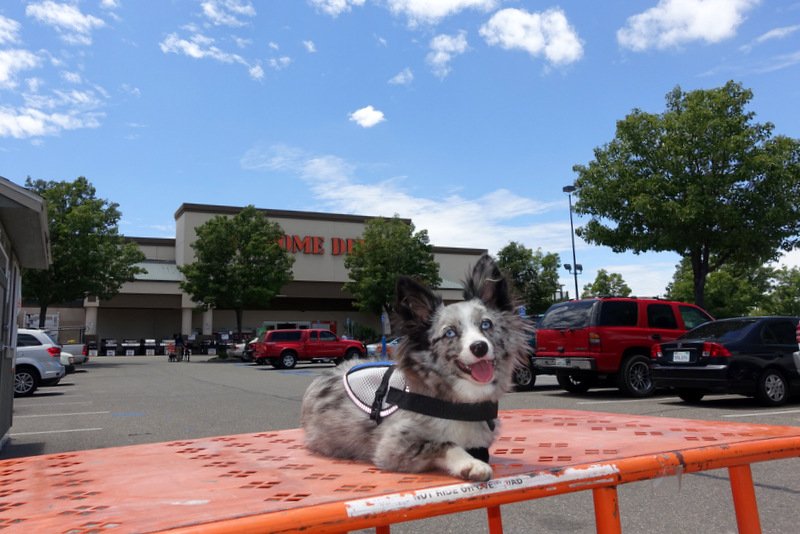GUIDE TO SERVICE DOG LAWS
SERVICE DOG LAWS: ADA REQUIREMENTS for Service Animals

U.S. Department of Justice, Civil Rights Division, Disability Rights Section
Overview of Service Dog Laws (updated 1/11/2024)
Service Dog law for guidance on the term “service animal” and the service animal provisions of the Service Dog law:
- Only dogs are recognized as service animals.
- A service animal is a dog that is individually trained to do work or perform tasks for a person with a disability.
- Service animals can accompany people with disabilities in all areas where members of the public are allowed to go.

How “Service Animal” Is Defined
Service animals are defined as dogs that are individually trained to do work or perform tasks for people with disabilities. Examples of such work or tasks include guiding people who are blind, alerting people who are deaf, pulling a wheelchair, alerting and protecting a person who is having a seizure, reminding a person with mental illness to take prescribed medications, calming a person with Post Traumatic Stress Disorder (PTSD) during an anxiety attack, or performing other duties. Service animals are working animals, not pets. The work or task a dog has been trained to provide must be directly related to the person’s disability. Dogs whose sole function is to provide comfort or emotional support do not qualify as service animals under the ADA.
This definition does not affect or limit the broader definition of “assistance animal” under the Fair Housing Act or the broader definition of “service animal” under the Air Carrier Access Act.
Some State and local laws also define service animal more broadly than the ADA does. Information about such laws can be obtained from the State attorney general’s office.
Instructions for ‘How To Get A Service Dog’
1. Read our website.
2. Get to know us on Facebook and see 100’s of dogs we trained.
3. Submit a Service Dog Application
Where Service Animals Are Allowed
Under the ADA, State and local governments, businesses, and nonprofit organizations that serve the public generally must allow service animals to accompany people with disabilities in all areas of the facility where the public is normally allowed to go. For example, in a hospital it would be inappropriate to exclude a service animal from areas such as patient rooms, clinics, cafeterias, or examination rooms. However, it may be appropriate to exclude a service animal from operating rooms or burn units where the animal’s presence may compromise a sterile environment.

Service Animals Must Be Under Control
Under the ADA, service animals must be harnessed, leashed, or tethered, unless these devices interfere with the service animal’s work or the individual’s disability prevents using these devices. In that case, the individual must maintain control of the animal through voice, signal, or other effective controls.

Inquiries, Exclusions, Charges, and Other Specific Rules Related to Service Animals
When it is not obvious what service an animal provides, only limited inquiries are allowed. Staff may ask two questions: (1) is the dog a service animal required because of a disability, and (2) what work or task has the dog been trained to perform. Staff cannot ask about the person’s disability, require medical documentation, require a special identification card or training documentation for the dog, or ask that the dog demonstrate its ability to perform the work or task.
- Allergies and fear of dogs are not valid reasons for denying access or refusing service to people using service animals. When a person who is allergic to dog dander and a person who uses a service animal must spend time in the same room or facility, for example, in a school classroom or at a homeless shelter, they both should be accommodated by assigning them, if possible, to different locations within the room or different rooms in the facility.
- A person with a disability cannot be asked to remove his service animal from the premises unless: (1) the dog is out of control and the handler does not take effective action to control it or (2) the dog is not housebroken. When there is a legitimate reason to ask that a service animal be removed, staff must offer the person with the disability the opportunity to obtain goods or services without the animal’s presence.
- Establishments that sell or prepare food must allow service animals in public areas even if state or local health codes prohibit animals on the premises.
- People with disabilities who use service animals cannot be isolated from other patrons, treated less favorably than other patrons, or charged fees that are not charged to other patrons without animals. In addition, if a business requires a deposit or fee to be paid by patrons with pets, it must waive the charge for service animals.
- If a business such as a hotel normally charges guests for damage that they cause, a customer with a disability may also be charged for damage caused by himself or his service animal.
- Staff are not required to provide care or food for a service animal.

California Laws on Psychiatric Service Dogs and Emotional Support Animals in Public Places
California law requires most public places to admit service dogs and psychiatric service dogs but not emotional support animals.
California law allows persons with disabilities to bring trained service dogs and psychiatric service dogs, but not emotional support animals, to all public places. Several different California laws set out the rights of people with disabilities who use animals to assist them. These laws include the Unruh Civil Rights Act, the California Disabled Persons Act (CDPA), and the Fair Employment and Housing Act (FEHA). (Federal disability rights laws, such as the Americans with Disabilities Act (ADA), also protect the rights of people who use service dogs and emotional support animals. For more information, see our article on federal law regarding service animals. When federal and state law differ, whichever one offers greater protection will generally apply.)

Which California Laws Protect Assistance Animals and When?
Which California law applies depends on three factors: what kind of animal it is, how the animal helps the disabled individual, and the setting or place involved.

Service Dog Defined
A “service dog,” under California law, is a dog trained to help a specific individual with a disability with services such as alerting to medical conditions, fetching dropped items, minimal protection work, rescue work, or pulling a wheelchair. There are two important things to note about the California’s definition of service dogs. First, it is limited to dogs. (But because the ADA authorizes the use of miniature horses as service animals in some limited circumstances, California does as well.)
Second, it is further limited to dogs that are trained to help individuals with their specific requirements. So, no animal other than a dog can qualify as a service animal, even if that animal is trained to assist a person with a disability. Furthermore, even a dog will not qualify as a service dog if it is not individually trained to help an individual with a disability (in a way that is related to his or her disability).

“Psychiatric” Service Dog Defined
California service dog law doesn’t have a separate definition for “psychiatric service dog,” but a dog that is individually trained to help a person with a mental disability with specific requirements is considered a service dog, and an individual that uses such a dog is entitled to the same rights under the law as someone with a physical disability that uses a service dog.
Examples of work or tasks that a service dog can be trained to perform for someone with a mental disability include:
- waking someone with clinical depression and coaxing them out of bed at a specified time in the morning
- responding to an owner’s panic attack by initiating contact to comfort the individual, and
- alerting a person exercising poor judgment due to bipolar disorder that they are driving dangerously.

Emotional Support Animal Defined
An “emotional support animal” is a dog or other animal that is not trained to perform specific acts directly related to an individual’s disability. Instead, the animal’s owner derives a sense of well-being, safety, or calm from the animal’s companionship and presence. An emotional support animal does not need to be a dog, but can be. (For more on the basic difference between service dogs and support animals, see Nolo’s article on service dogs and support animals.)
How California Protects Service Dogs in Public Areas
California service dog law guarantees people who use trained service dogs full and equal access to public places.

What Places Are Considered Public?
In California, the service dog law guarantees apply to an even broader range of public places than the ADA covers, including:
- any place to which the general public is invited (including restaurants, hotels, theaters, shops, concert halls, and government buildings)
- medical facilities, such as hospitals, clinics, and physicians’ offices, and
- any public conveyance or mode of transportation (airplanes, motor vehicles, trains, buses, streetcars, boats), whether private, public, franchised, licensed, or contracted.
Public places must allow persons with disabilities to bring in their service dogs and, if necessary, they must modify their practices and to accommodate the dogs. Public places must also permit an authorized trainer to bring in a service dog, even if the trainer herself doesn’t have a disability.

Can the Operator of a Public Place Require Proof That an Animal Is a Service Dog?
A public place can ask only two questions to determine if that individual’s dog is a service dog:
- whether the dog is required because of a disability, and
- what work the dog is trained to perform.
The public place cannot require a person to “prove” that their dog is a service dog. A service dog is not required to be registered, certified, or identified as a service dog. However, in California, pretending to be an owner of a service dog is a criminal misdemeanor punishable by a fine of up to $1,000 (and/or up to six months imprisonment).

What About Zoos and Wild Animal Parks?
California has specific rules regarding the use of service dogs at zoos or wild animal parks. Such places are not required to allow service dogs in areas where animals are not separated from the public by a physical barrier. But a zoo or park that doesn’t allow service dogs into such areas must provide free, clean, and safe kennel facilities. Under some circumstances, the facility must also provide certain additional accommodations–such as free transportation and sighted escorts–to blind or visually impaired patrons and to individuals who rely on their service dog for mobility.

Does California Protect the Use of Emotional Support Animals?
The protections discussed above do not apply to emotional support animals. California service dog law, like federal service dog law, doesn’t require that emotional support animals be allowed in public places.
California does have service dog laws, however, protecting the use of emotional support animals in other settings. To learn more, see Nolo’s articles on when California landlords have to allow psychiatric service dogs and emotional support animals and how California protects psychiatric service dogs and emotional support animals in the workplace. In addition, federal law allows people with disabilities to bring their emotional support animal onto an airplane. (See Nolo’s article on federal protections for emotional support animals.)

What Disabilities Qualify a Person to Use a Service Dog or Support Animal?
California service dog law typically offers greater protection than federal law for persons with disabilities. For example, California defines “disability” more broadly than the ADA does. Under the federal ADA service dog law , a physical or mental impairment qualifies as a disability only if it “substantially limits” a major life activity. In California, a physical or mental impairment need only limit (not “substantially” limit) a major life activity, which simply means that the impairment must make the achievement of the major life activity difficult.
In California, a mental disability includes any mental or psychological disorder or condition–such as intellectual disability, clinical depression, bipolar disorder, organic brain syndrome, emotional or mental illness, or specific learning disabilities–that limits a major life activity. A major life activity refers to physical, mental, and social activities and working. California does not, however, consider compulsive gambling, kleptomania, or unlawful substance use disorders to be mental disabilities.
SERVICE DOG SCHOOL of AMERICA
Service Dogs California
Service Dog School of America is a psychiatric service dog organization that provides those with disabilities complete, accurate and up-to-date information regarding California Service Dog Laws and Service Dog Requirements for owners with disabilities in California.


